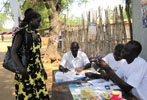
Northern and southern Sudanese authorities alike engaged in serious human rights abuses throughout the electoral process, said Human Rights Watch in a report today that called for these violations to be addressed before the southern referendum on self-determination.
Beyond documenting the various abuses—intimidation, physical force, and arbitrary arrests—leading up to and during elections (well-chronicled in preliminary statements from the Carter Center and the European Union observer mission as well), the report significantly highlights the expansion of ruling party abuses and control over political space in the elections aftermath. “Since the election, the situation has worsened,” HRW reports.
In the North, pre-publication censorship, briefly lifted during the elections, has resumed for several papers. Several leading activists have been prevented from moving and traveling freely (to the ICC and elsewhere.)
In the South, the SPLM and its army are preoccupied with putting down rebellions ostensibly linked to disgruntled, opposition politicians who did not win. Members of the SPLM or SPLA, the party’s army, say that rather than being representative of grassroots discontent toward the conduct of elections, these rebellions are actually inspired and supported by the North.
But even beyond charges of northern manipulation, statements by government officials to Enough during a field trip last week indicate that the ruling party in the South has little tolerance for political opposition anyway. In an interview, a State Police Commissioner unequivocally characterized opposition demonstrations as a “crime.” Other political elites acrimoniously explained that those candidates who chose to run as independents (after not receiving the party nomination) “betrayed the party.”
The specter of a failed referendum is the explanation, or perhaps excuse, behind the SPLM’s severe attitude toward its population—just as it was for the international community in its decision to do little to condemn these ongoing abuses. While many people Enough has interviewed in South Sudan seem tolerant of, if not pleased with, the arrangement so far, there will be a clear deadline for a change in governing style—if secession occurs smoothly. Whether the SPLM rises to the challenge will determine the length of its tenure and more importantly, whether the population finally begins experiencing the independence that so many see as synonymous with separation.

